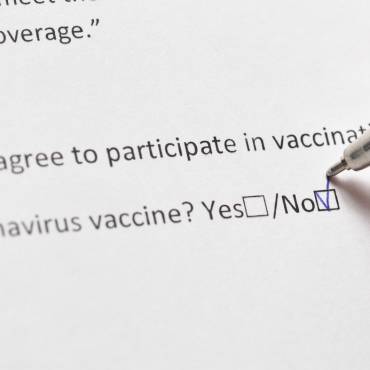Babies born to mothers naturally immune to measles following infection are protected from the disease for longer than those whose mothers acquired measles immunity through measles-mumps-rubella immunisation, research has shown. Authors of the study, published online today in The Journal of Infectious Diseases, suggest that when the risk of measles is high, babies should receive their first MMR dose earlier than usual, even though the vaccine efficacy would be lower because their immune systems are not yet mature.
Researchers in the Netherlands compared the concentration of antibodies against viruses in blood samples taken from babies and women of childbearing age in the general population with the concentration in samples from babies and women in the orthodox protestant community, in whom vaccination uptake is low and in whom there have been recent outbreaks of measles, mumps, and rubella.
They estimated that protection by maternal antibodies among infants in the general population, most of whose mothers had been vaccinated, lasted just 3.3 months for measles, 2.7 months for mumps, 3.9 months for rubella, and 3.4 months for varicella. Babies living in the orthodox community, most of whose mothers had not been vaccinated, retained their immunity to measles for two months longer than babies in the general population. And mothers in the orthodox communities had higher concentrations of antibodies to rubella than those in the general population.
The study’s authors warn that as the first European cohort of vaccinated women is now reaching childbearing age, there could be a large pool of children unexpectedly vulnerable to infection because of the shortened duration of protection that they discovered. They suggest that when children’s risk of exposure to measles is high – for example, if they live in an area experiencing an outbreak, or if they are travelling to endemic areas – the age at which the first MMR dose is given should temporarily be reduced.
They conclude: “The average age at which a child loses the protection of its maternal antibodies and becomes susceptible to measles, mumps, and rubella lies well before the age of first MMR vaccination. It is extremely important to protect this large number of susceptible children, who have a high probability of a severe outcome when infected.
“An obvious solution is to lower the age at which the first dose of MMR is administered, but this could lower the vaccine efficacy because immunisation at a younger age is hampered by different factors, such as the immaturity of the immune response. An alternative solution is to temporarily lower the age at which the first dose of MMR vaccine is administered to one when the risk of exposure to measles is high.”
The authors of an accompanying editorial agree that early immunisation would be the most effective strategy to protect babies under a year old when the risk of measles is high.
Source: Onmedica, 9th May 2013. http://www.onmedica.com/newsarticle.aspx?id=7c4b2c09-5598-4935-8280-9b3ea650f54b


